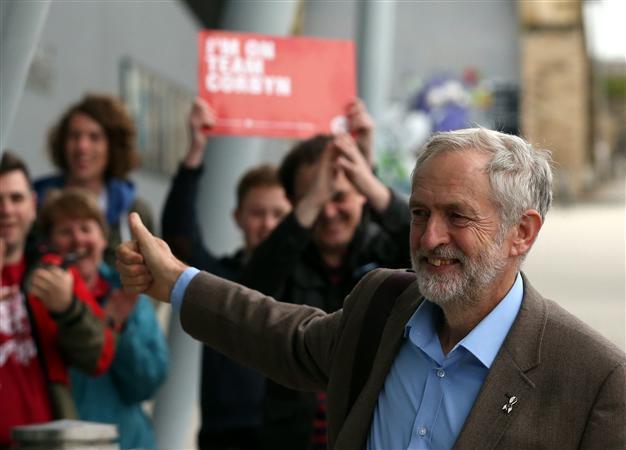UK Labour's leadership vote closes with Corbyn favourite
LONDON – Agence France-Presse

Labour's Jeremy Corbyn arrives to take part in a Labour party leadership final debate, at the Sage in Gateshead, England, Thursday, Sept. 3, 2015. AP Photo
Voting ends on Sept.10 in the leadership contest for Britain's main opposition Labour party after a campaign dominated by the shock popularity of radical left candidate Jeremy Corbyn, who looks set to win.Corbyn was attracting 53 percent support from those intending to vote, according to the most recent opinion poll from YouGov in mid-August, in a race whose result will be announced on Sept.12.
His victory seems barely in doubt.
Corbyn, 66, is closer to European anti-austerity movements like Greece's Syriza and Spain's Podemos than Tony Blair.
He has become the darling of youthful and elderly Labour supporters as well as the powerful trade unions, all tired of the centrist policies of senior Labour figures like Blair, prime minister from 1997 to 2007.
Corbyn holds his final rally on Sept.10 in his home constituency in north London before a sell-out crowd, as has often been the case, after the ballots close at 1100 GMT.
Grey-haired and with a close-cropped beard, often sporting sandals and looking like a retired teacher, he is neither a great orator nor a charismatic leader.
But faced with his campaign, the other three candidates -- Andy Burnham, Yvette Cooper and Liz Kendall, all polished fortysomethings advocating more centrist policies -- have struggled to galvanise support and Corbyn was 6/1 on with bookmakers as polls were about to close.
"He has triumphed because he represents a rejection of conventional politics and also because Labour's mainstream candidates failed to inspire excitement or hope," Andrew Harrop, general secretary of left-wing think-tank the Fabian Society, told AFP.
Ironically, many commentators blamed Labour's defeat under leader Ed Miliband by David Cameron's Conservatives in May on a more leftist policy agenda pursued since 2010.
Four months later, the party looks set to vote for a far more left-wing figure, who is fond of bicycling around his constituency in London's gentrifying Islington North, as its leader.
Support for Corbyn may have been fuelled by the belief among some Labour voters that neither Burnham, Cooper nor Kendall would fare any better than Miliband did.
"They also feel a sense of despair at the prospect of at least a decade of Conservative rule, so they are choosing forthright, principled opposition over the compromise and discipline needed to prepare for government," added Harrop.
The opening up of the vote -- previously reserved for members of the party and trade unions -- to anyone willing to pay 3 (four euros, $4.50) will also play a key role in the outcome, with over 600,000 people having applied.
But Burnham complained on Sept.10 that some members had not received their ballot papers, although he does not want the voting deadline extended.
Corbyn has run a good campaign, avoiding "difficult questions" on issues such as his views on the Middle East and Britain's place in the European Union, said Iain Begg, a professor at the London School of Economics.
A pacifist who wants to scrap Britain's nuclear weapons, Corbyn believes Islamist movements Hamas and Hezbollah should be involved in Middle East peace talks.
Finance Minister George Osborne, the second most powerful figure in the ruling Conservative Party, said such policies would be "a real risk to Britain's security", hinting at how his party will target the likely new leader.
"We don't regard what is being said in the Labour leadership contest as a joke," he wrote in the New Statesman.
"I regard these things as a real risk to Britain's security were they ever to have the chance to be put into practice."
Corbyn seems to be keeping his options open on the EU ahead of Britain's referendum on whether to leave the bloc, which must be held by the end of 2017.
Few believe he can ever be elected prime minister.
"With Corbyn, the chance that Labour could win in 2020 (the date of the next general election) is minimal," said Begg.
But Harrop added that Corbyn's legacy could be long-lasting if Labour splits between centrist and leftist elements.
"The influence of his hard-left supporters could spread... in that case, Labour is likely to be out of power for a long time and may struggle to continue as a single party," he said.
















